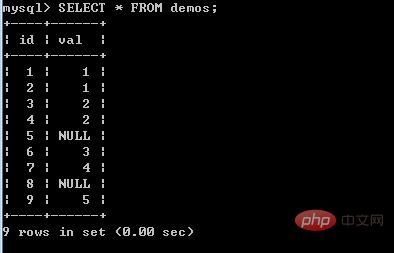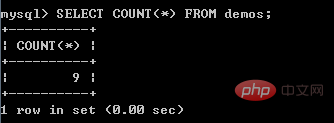How to count query results in mysql
Statistical method: 1. Use "COUNT(*)" to count all query results, and the syntax is "SELECT COUNT(*) FROM table name;". 2. Use "COUNT (field name)" to count non-NULL results, the syntax is "SELECT COUNT (column name)" FROM table name;". 3. Use "COUNT (DISTINCT field name)" to count non-NULL results without duplication, Syntax "SELECT COUNT(DISTINCT column name)" FROM table name;".

The operating environment of this tutorial: windows7 system, mysql8 version, Dell G3 computer.
In mysql, you can use the COUNT() function to count query results.
MySQL COUNT() function
The COUNT() function counts the total number of record rows contained in the data table, or returns columns based on query results The number of data rows contained in
The return type of the COUNT() function is BIGINT. If no matching row is found, the COUNT() function returns 0.
COUNT() function has three syntaxes:
COUNT(*) COUNT(字段名) COUNT(DISTINCT 字段名)
COUNT(*)
COUNT(*)The function returns The number of rows in the result set returned by the SELECT statement. COUNT(*)The function counts rows containing NULL and non-NULL values, that is: all rows.
If you use the COUNT(*) function to count numeric rows in a table without using a WHERE clause to select additional columns, it performs very quickly.
This optimization only applies to MyISAM tables because the row number of a MyISAM table is stored in the table_rows column of the tables table of the information_schema database; therefore, MySQL can retrieve it very quickly.
COUNT(column name)
COUNT(field name)Returns the number of rows that do not contain NULL values.
COUNT(DISTINCT column name)
COUNT(DISTINCT field name)Returns the number of unique rows that do not contain NULL values.
The DISTINCT operator allows different values in the calculation result, that is, deduplication.
MySQL COUNT example
Create a new table named demo and insert Some sample data
-- create a demos table CREATE TABLE IF NOT EXISTS demos( id int auto_increment primary key, val int );

-- insert some sample data INSERT INTO demos(val) VALUES(1),(1),(2),(2),(NULL),(3),(4),(NULL),(5);

-- select data from demos table SELECT * FROM demos;

To count all rows in the demos table, please use the COUNT(*) function
SELECT COUNT(*) FROM demos;

You can add a WHERE clause to specify a condition to count , for example, to only count rows where the val column contains a value equal to 2, use the following query:
SELECT COUNT(*) FROM demos WHERE val = 2;

Two NULL values in the val column will be ignored.
To count the unique rows in the demos table, you can add the DISTINCT operator to the COUNT function, as follows:
SELECT COUNT(DISTINCT val) FROM demos;
Ignore the two duplicate values 1, 2 and the two NULL values in the count.
[Related recommendations: mysql video tutorial]
The above is the detailed content of How to count query results in mysql. For more information, please follow other related articles on the PHP Chinese website!

Hot AI Tools

Undresser.AI Undress
AI-powered app for creating realistic nude photos

AI Clothes Remover
Online AI tool for removing clothes from photos.

Undress AI Tool
Undress images for free

Clothoff.io
AI clothes remover

Video Face Swap
Swap faces in any video effortlessly with our completely free AI face swap tool!

Hot Article

Hot Tools

Notepad++7.3.1
Easy-to-use and free code editor

SublimeText3 Chinese version
Chinese version, very easy to use

Zend Studio 13.0.1
Powerful PHP integrated development environment

Dreamweaver CS6
Visual web development tools

SublimeText3 Mac version
God-level code editing software (SublimeText3)

Hot Topics
 MySQL's Role: Databases in Web Applications
Apr 17, 2025 am 12:23 AM
MySQL's Role: Databases in Web Applications
Apr 17, 2025 am 12:23 AM
The main role of MySQL in web applications is to store and manage data. 1.MySQL efficiently processes user information, product catalogs, transaction records and other data. 2. Through SQL query, developers can extract information from the database to generate dynamic content. 3.MySQL works based on the client-server model to ensure acceptable query speed.
 How to start mysql by docker
Apr 15, 2025 pm 12:09 PM
How to start mysql by docker
Apr 15, 2025 pm 12:09 PM
The process of starting MySQL in Docker consists of the following steps: Pull the MySQL image to create and start the container, set the root user password, and map the port verification connection Create the database and the user grants all permissions to the database
 Laravel Introduction Example
Apr 18, 2025 pm 12:45 PM
Laravel Introduction Example
Apr 18, 2025 pm 12:45 PM
Laravel is a PHP framework for easy building of web applications. It provides a range of powerful features including: Installation: Install the Laravel CLI globally with Composer and create applications in the project directory. Routing: Define the relationship between the URL and the handler in routes/web.php. View: Create a view in resources/views to render the application's interface. Database Integration: Provides out-of-the-box integration with databases such as MySQL and uses migration to create and modify tables. Model and Controller: The model represents the database entity and the controller processes HTTP requests.
 Solve database connection problem: a practical case of using minii/db library
Apr 18, 2025 am 07:09 AM
Solve database connection problem: a practical case of using minii/db library
Apr 18, 2025 am 07:09 AM
I encountered a tricky problem when developing a small application: the need to quickly integrate a lightweight database operation library. After trying multiple libraries, I found that they either have too much functionality or are not very compatible. Eventually, I found minii/db, a simplified version based on Yii2 that solved my problem perfectly.
 How to install mysql in centos7
Apr 14, 2025 pm 08:30 PM
How to install mysql in centos7
Apr 14, 2025 pm 08:30 PM
The key to installing MySQL elegantly is to add the official MySQL repository. The specific steps are as follows: Download the MySQL official GPG key to prevent phishing attacks. Add MySQL repository file: rpm -Uvh https://dev.mysql.com/get/mysql80-community-release-el7-3.noarch.rpm Update yum repository cache: yum update installation MySQL: yum install mysql-server startup MySQL service: systemctl start mysqld set up booting
 Centos install mysql
Apr 14, 2025 pm 08:09 PM
Centos install mysql
Apr 14, 2025 pm 08:09 PM
Installing MySQL on CentOS involves the following steps: Adding the appropriate MySQL yum source. Execute the yum install mysql-server command to install the MySQL server. Use the mysql_secure_installation command to make security settings, such as setting the root user password. Customize the MySQL configuration file as needed. Tune MySQL parameters and optimize databases for performance.
 Laravel framework installation method
Apr 18, 2025 pm 12:54 PM
Laravel framework installation method
Apr 18, 2025 pm 12:54 PM
Article summary: This article provides detailed step-by-step instructions to guide readers on how to easily install the Laravel framework. Laravel is a powerful PHP framework that speeds up the development process of web applications. This tutorial covers the installation process from system requirements to configuring databases and setting up routing. By following these steps, readers can quickly and efficiently lay a solid foundation for their Laravel project.
 MySQL and phpMyAdmin: Core Features and Functions
Apr 22, 2025 am 12:12 AM
MySQL and phpMyAdmin: Core Features and Functions
Apr 22, 2025 am 12:12 AM
MySQL and phpMyAdmin are powerful database management tools. 1) MySQL is used to create databases and tables, and to execute DML and SQL queries. 2) phpMyAdmin provides an intuitive interface for database management, table structure management, data operations and user permission management.







